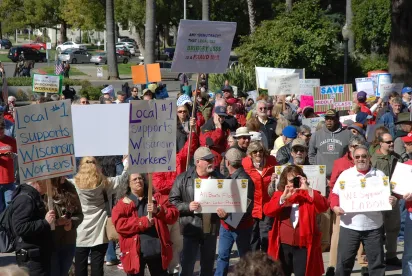Two major developments this week illustrate a new landscape for employers with regard to union organizing campaigns.
First, the National Labor Relations Board has reported a dramatic increase recently in the number of union election petitions (i.e., requests for elections to decide whether a union may represent a group of workers). During the first half of Fiscal Year 2022 (October 1–March 31), the number of union election petitions increased 57% from the second half of FY2021. This represents a major increase from historical averages as well and, if the pace continues, it will constitute the highest number of petitions in well over a decade.
This confirms what other recent signs have illustrated, i.e., that unions are uniquely positioned at this time to organize new groups of workers. Because a petition for a union to represent a new group requires evidence that at least 30% of the employees support the union (as is the case for the vast majority of these petitions), this increase appears to be objective evidence that support for unions has increased among U.S. workers. There have been many other similar indicators of late, such as unions’ recent success in organizing workers at Starbucks, many historically non-union retailers, and distribution facilities which have drawn national attention.
Then, on Thursday, the NLRB announced a major potential shift in the law regarding union organizing campaigns. For decades, courts and the board have recognized that employers may lawfully require employees to attend mandatory meetings where the employer lawfully communicates information about unionization (subject to certain limits on the timing of those meetings and content of the communications). Employers frequently hold such meetings, before and during pre-election campaigns, in order to ensure employees understand key facts regarding unionization, as well as the employer’s view on the matter. Under the law, a union can spend months or even years attempting to persuade employees before it announces its presence or requests an election, but then potentially obtain an election within 4-5 weeks of announcing its presence, so these meetings have represented a key avenue for employers who are seeking to ensure employees understand both sides of the issue and the impact of their vote.
Now, the NLRB’s General Counsel has announced that she will request the NLRB to deem these types of mandatory meetings unlawful. The General Counsel asserted, in a public memorandum addressed to NLRB field offices, that these meetings violate employees’ “right to refrain from listening to employer speech concerning the exercise of their Section 7 rights [to engage in certain union-related activities and other protected concerted activities].” The General Counsel recognized that the NLRB had previously deemed these meetings to be lawful, but asserted that those decisions were wrongly decided.
This announcement dramatically changes the landscape for employers, even if the General Counsel does not succeed in overturning established law. As of now, employers who hold such mandatory meetings run the risk that the NLRB will deem them to have violated federal labor law (even if such a decision would be highly vulnerable to challenge). As a result, employers should proceed cautiously, and strongly consider involving counsel, when assessing their options for communicating with employees about union organizing or other matters that involve employees’ exercise of Section 7 rights.
Moreover, if the General Counsel does succeed, employers will lose one of their core methods for communicating with employees about these crucial matters. Further, if the NLRB does decide to limit employers’ right to communicate in this way due to employees’ asserted “right to refrain from listening,” that decision would raise questions about whether and how employers may communicate their positions on unionization via other means, such as letter, email, and individual discussions.
Employers should closely monitor this issue going forward. 2022 already has been an landmark year for union organizing, and there should be several key developments yet to come.




 />i
/>i

